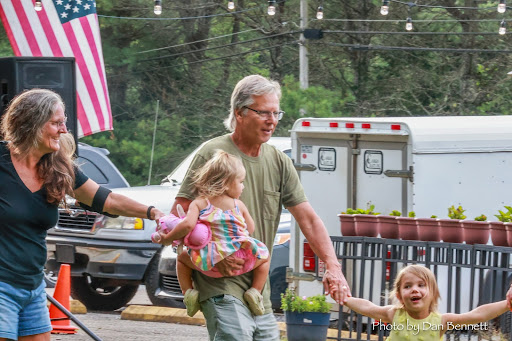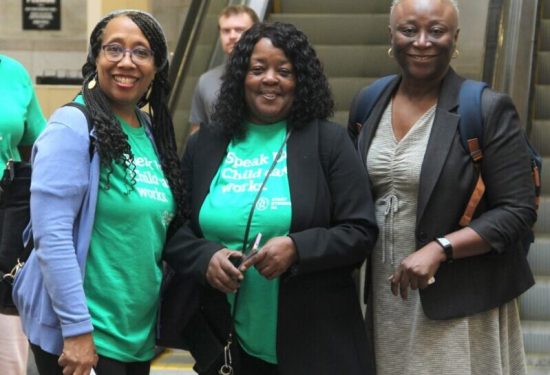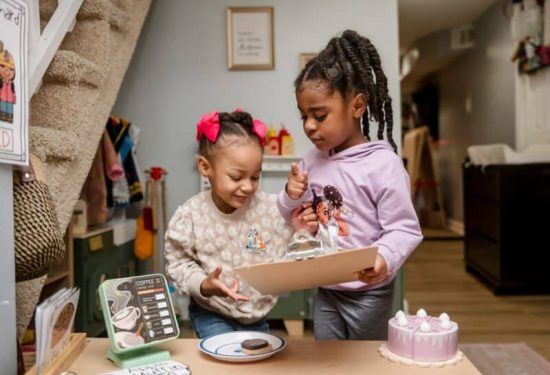Jessica Stone was pregnant with her second child when her marriage disintegrated. A Florida kindergarten teacher who had planned to stay home with her toddler and newborn while her husband provided, Jessica suddenly found herself in a child care crisis: her marriage had ended, she needed to go back to work, and she couldn’t afford (or find) childcare for two young children.
Distraught and desperate, Jessica turned to the people who couldn’t say no: her own mom and dad. A Harris Poll conducted in February 2023, reports that 42 percent of working parents in America rely on grandparents to take care of their children while they work. Most say they would be “lost” without their parents’ assistance—unable to manage their workload and pursue their career goals, or forced to quit their jobs because they can’t afford other child care or can’t find a provider to cover their nontraditional hours.
Jessica’s mom Sandie had just retired from the classroom herself and had planned to move to a house in the North Carolina mountains where she and husband Jim would settle into their golden years crafting, boating, and enjoying the “freedom to do those things we never had time for when we were raising kids or working full time.” Instead, she and Jim (who soon afterward retired from his own job as an electrical engineer), both in their early sixties, started a new job: as 7 a.m. – 5 p.m. child care providers for Isabelle, then 2, and Adalynne, a newborn.

Sandie and Jim Stone out and about with their grandchildren in Brevard, North Carolina
“Of course we thought it was temporary,” says Sandie. “A way to give our daughter a fresh start and recover from an emotionally devastating time.” But two years in, after sinking their retirement funds into the downpayment on a second North Carolina house for their daughter and her family, they still spend their days feeding, playing with, and teaching their grandchildren. “The oldest one goes to preschool for 3 hours a day, and during that time we’re doing laundry, housework, doctor’s visits, getting a haircut, or an oil change. So the ukulele and the water colors I bought thinking I’d learn how to play and paint in my retirement are still waiting in the closet.”
The Stones recognize that many other grandparents don’t have the “good fortune” to step in as full-time caregivers, and they are happy to have bonded so closely with their granddaughters. They and the girls spend a lot of time at the lake playing in the sand, at the local library, and even at local street dances and festivals. As a former kindergarten teacher herself, Sandie knows how important outside time and reading are to their emotional and academic development. And it warms her heart to see her granddaughter play teacher (just like mom and grandma). “She turns the book so we can see the pictures and points to each thing in the picture, just like a teacher. This is a precious gift.”
At the same time, says Sandie, “we’ve given up our turn to just spend our time together now. And for families without the financial means, good health, the training I’ve had as an educator, or just single grandparents, this is impossible. I mean it’s really tough!”
Jim pipes in here to add, “Their only option when there’s no child care available is to just not work. Actually our daughter would love to do that, but how is she going to eat? How will she put clothes on the children and pay the electric bill and put gas in the car?”
Thankfully, the Stones find support with other caregivers at a monthly gathering of family, friend, and neighbor (FFN) child care providers sponsored by Smart Start of Transylvania County at a community center called The Family Place. There, caregivers, many of them grandparents, swap stories about the funny things kids do and share lessons learned–sometimes the hard way. They also receive free educational resources and training in things like infant CPR or the best way to redirect a toddler who’s throwing a tantrum. The time invested in learning all over again what it takes to raise kids, that’s another cost grandparents are paying, according to Sandie.
Reliance on grandparents to step in as full-time child care providers is a deep crack in America’s broken child care system, which leans precariously on the nuclear family to solely care for children until age 5. In North Carolina, 60 percent of parents depend on family, friends, or neighbors to care for their preschool age children. Yet, the federal government and the vast majority of states provide no support for relatives who provide child care. Without additional public investment in child care, grandparents like the Stones will keep trying to repair the crack, though they are mostly unpaid and undervalued. “There’s got to be a better way,” says Sandie.


